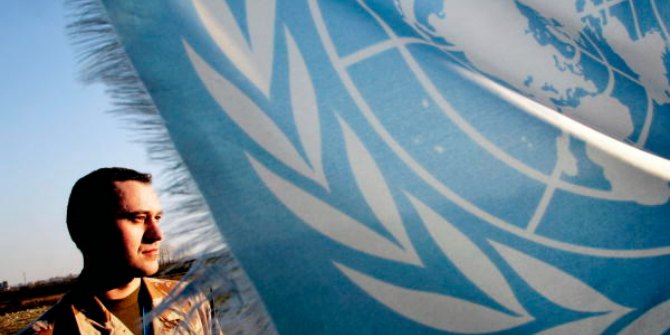The United Nations was established to safeguard world peace and security, development, and human rights, yet it is undeniable that it sometimes fails to protect the rights of a great many people. This book aims to look at the reasons for that failure. Rosa Freedman offers explanations of how and why the organisation is unable, at best, or unwilling, at worst, to protect human rights. Ben Warwick recommends this read for the understanding of global inaction on grave rights abuses it brings.
This review was originally published on the LSE Review of Books.
 Failing to Protect: The UN and the Politicisation of Human Rights. Rosa Freedman. C Hurst & Co. May 2014.
Failing to Protect: The UN and the Politicisation of Human Rights. Rosa Freedman. C Hurst & Co. May 2014.
Imagine a family sitting warm, safe, and comfortable at home, when the six o’clock news beams pictures of desperation and gross human rights violations in to their living room. “Switch that off; change the channel”, someone says. “I don’t want to think about that while I eat my dinner”.
A stark, unpleasant, and disturbing picture. Yet Rosa Freedman, in Failing to Protect: The UN and the Politicisation of Human Rights, forces us consider whether the United Nations also ‘changes the channel’ when it is presented with accounts of systematic rights abuses. Freedman, a senior lecturer at the University of Birmingham, is the author of authoritative works on the UN Human Rights Council and is very well placed to guide readers through the UN’s complexities. Freedman uses this expertise to uncover the conspicuous contrasts between the calculating, paralysing politics of countries at the UN, and the horrific violations of human rights they discuss. This book shatters any illusion that the UN as it currently stands is a wholly benign agent for change.
Designed to be accessible to non-specialists, the book avoids the endless acronyms, committee names and document numbers that are often a feature of works in this area The aim of the text is to encourage the public-at-large to ‘start asking questions’ (p. xi), and it remains true to this aim by equipping readers with the information needed to engage in central debates. Freeman details the relevant sources of law, and gives user-friendly analogies with domestic legal situations to make the complexities of international law comprehensible. The book is rich with examples of past failures of the UN, and reflects the author’s clear understanding of the finest details of UN architecture. Freedman also analyses the UN human rights machinery, and key conceptual debates (such as those surrounding cultural relativism (ch. 5)), in a way that empowers the reader to form their own view and become involved in the reform projects.
Besides showing ways in which the UN is ‘failing to protect’, Freedman offers several key reasons for this failure. The first reason offered is that the ‘the UN’ lacks power. The book shows that ‘the UN’ is only as good as the states of which it is composed, and explodes the myth that the institution has any significant power to act independently of its member countries (pp. 13, 17). It follows that for real action, there must be real political agreement. The diversity of countries and the different dynamics within the UN makes finding such agreement difficult. Often this leads to a heavy reliance on mechanisms with much less binding power over states, as agreement can be reached on these more easily. Non-binding resolutions and the soft power of expert Special Rapporteurs (p. 54) are prime examples of this.

The bloc voting tactics are firmly established through the pages of this book as an element of UN life that casts a long shadow over its effectiveness. Countries form alliances based on religion, political outlook, geography, and forms of governance (p. 23). Freedman shows how problems can occur as groups ‘flex their collective muscles in order to achieve joint objectives’ (p. 23). Clashes and stalemates between opposed groupings of states cause action on important human rights issues to be stalled by politicisation. The disappointingly slow development of the rights of Lesbian, Gay, Bisexual and Transgender (LGBT) persons is highlighted as an example of this ‘Realpolitik’ in action (p. 49). The strength of opposition from African Group countries and members of the Organisation of Islamic Cooperation prevented basic resolutions being adopted for many years. This was despite the unequivocal support of the UN Secretary-General for recognising LGBT rights.
As is shown in chapter 6, these bloc tactics do not only act to prevent resolutions and action. The forces of influential groupings can work in the opposite direction and combine to result in ‘excessive and disproportionate attention’ to a particular situation (p. 60). Although ‘[n]o one would suggest that attention ought not to have been devoted’ to issues such as the ending of apartheid or to the situation in Palestine, there are serious questions raised about the reasons why these countries garner such attention (p. 67). The book provides a clear answer; without the political cover and support of a powerful bloc, governments are left isolated and liable to criticism. Such high profile criticism has sometimes yielded results, especially in the case of South Africa, but comes at the cost of ignoring multiple other human rights abuses. Similar racial oppression was simultaneously occurring in the Soviet Union, China, the US, Australia, and Canada but received little or no attention (p. 61). All of this ‘undermines the [UN’s] credibility and ability to fulfil its mandate’ (p. 21).
Although Freedman is unapologetically critical of the UN’s failings, she does not cast it aside as a failed enterprise. A section of the book is dedicated to solving some of the problems that have dogged the system. Here, a number of possible reforms to the workings of the UN human rights structures are discussed, ranging from the ‘radical’ to the more achievable. The possibility of a World Court of Human Rights, better use of regional human rights systems, and the greater use of political and economic leverages are all mooted as potential alterations to the status quo. Freedman is clearly under no illusions as to the difficulties with each of these reform projects; in her words ‘the path of least resistance would be to do nothing’ (p. 163). These difficulties, the book argues however, are no reason for the public to abdicate responsibility; ‘[w]here we go next is not simply for the diplomats and government delegates to decide’ (p. 167).
Whether or not you believe the UN is perfect, this book is a recommended read for the understanding of global inaction on grave rights abuses it brings. If, like Freedman, you want to take responsibility for the UN’s inaction and begin a conversation on how to better protect human rights, then this book is especially for you.
——————
Ben Warwick is a Graduate Teaching Assistant and PhD candidate at Durham Law School. His research centres on resource constraints and the implementation of economic and social rights. He is a member of the Durham Human Rights Centre and the Economic and Social Rights Academic Network (UK and Ireland).






